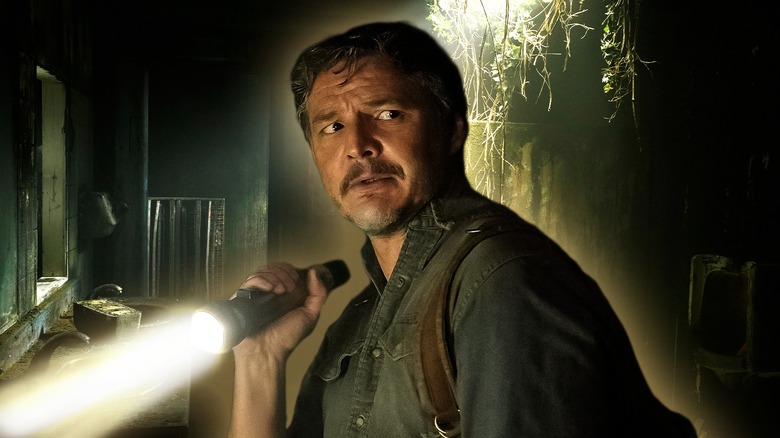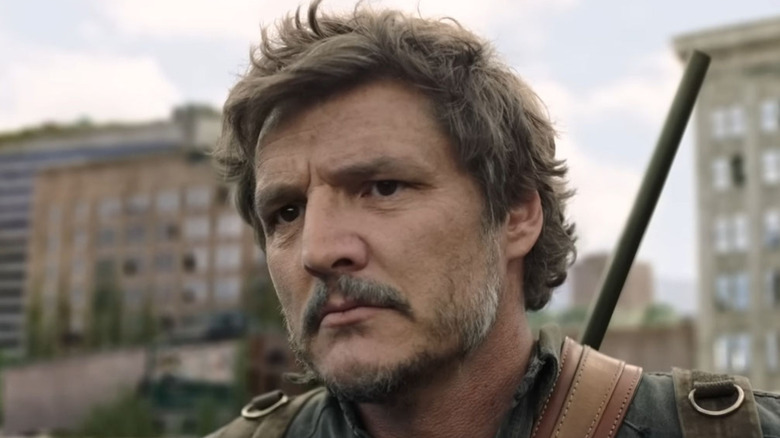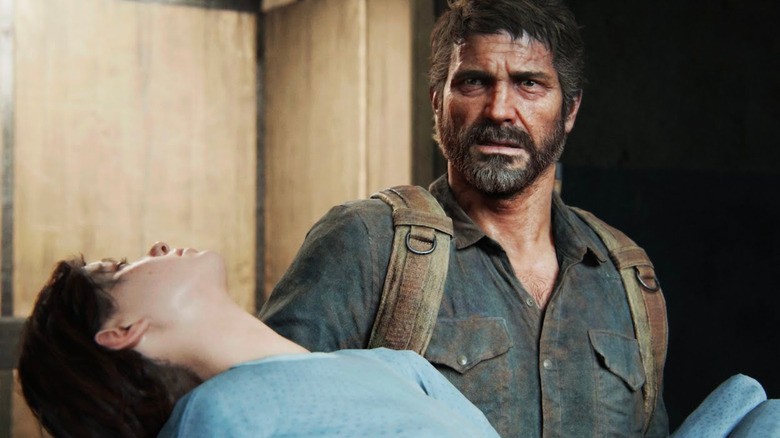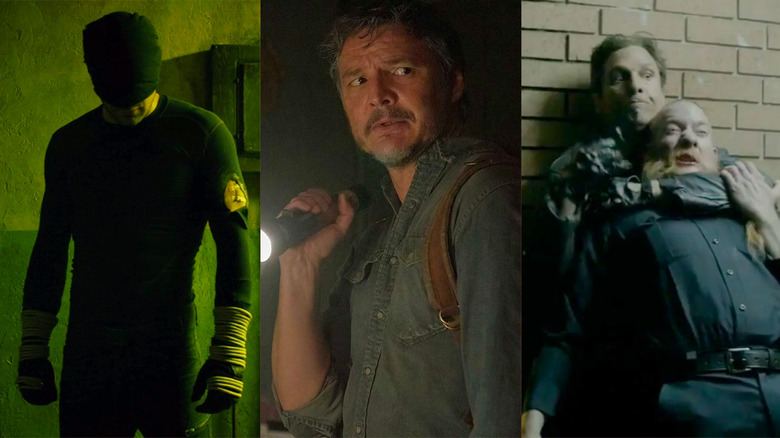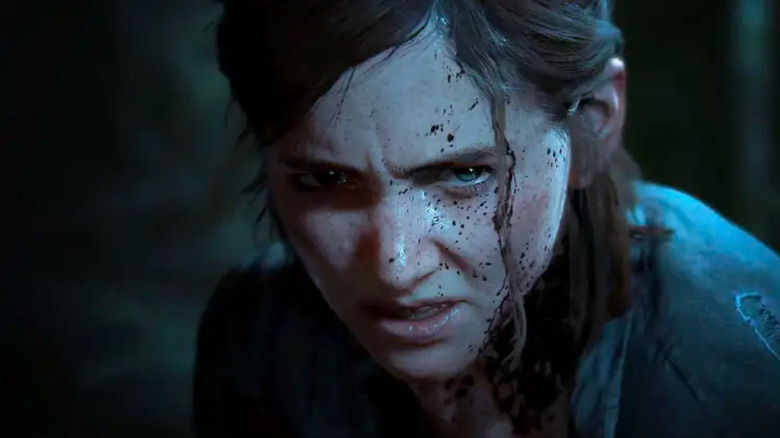The Last Of Us Finale Misfired In Its Final Moments With Joel (& How Simplicity Could Have Saved It)
Contains spoilers for "The Last of Us" Season 1, Episode 9 – "Look for the Light"
So there we have it. "The Last of Us" ends like every episode before it, with a beautiful development being shattered in its closing moments. In the case of the show's finale, it was the fresh and fortified bond between Joel (Pedro Pascal) and Ellie (Bella Ramsey) tainted by a lie one created to protect the other. Unsure about Joel's rundown of why she's ended up back at Jackson and not still in a hospital bed, Ellie asked her protector if everything he'd said happened had gone down as he described. Seconds lingered in silence before Joel assured her it had and that, according to him, a cure wasn't possible, and the discovery was only made right before the hospital was stormed and the Fireflies were killed. Of course, we all know differently.
The truth was that Joel, having learned that Ellie would be killed to make a cure, took it upon himself to go back and get her out, no matter the cost. It's a plot point, like so much else in this stunning adaptation, closely follows the source material and is still just as gut-wrenching as it's always been.
However, the live-action execution of Joel's war veered in a direction it absolutely shouldn't have, and it would've been better if this sequence cut down on the action hero tropes and booming music, to instead depict the action with the tension, desperation, and simplicity it merited.
The Last of Us slowed things down when it shouldn't have
As soon as Joel's switch was flipped and we heard, "I don't have time for this," fans knew that Pedro Pascal's worn-down protagonist was about to go off. So far, the show has stuck to most of the game's dramatic beats with characters and their arcs, but what was coming was an all-out bloodbath, with the seasoned smuggler taking down anyone that stood in his way. The massacre was musically charged, accompanied by Gustavo Santaolalla's iconic score lowering the pace and giving the shootout classic western vibes.
The issue here is that really didn't need such a loud, dramatic scene.
The sequence seemed to suck out all the tension of a moment that should've been loaded with it. We didn't need an attack in the vein of "John Wick," but one demonstrating the danger that had us fearing for Joel as much as the girl he was trying to protect. In the game, tension is high, and Joel (the player) is firing on all cylinders. Molotov cocktails, nail bombs and carefully placed shots are used where ammo is intentionally in scarce supply. It's desperate. It's scary. Instead, here Joel became almost Terminator-like, storming the hospital like Schwarzenegger's unstoppable killer swapping out police officers for (very important) doctors.
For once, "The Last of Us" should've committed a cardinal sin of video game adaptations — for the sake of suspense, and to play off a previous revelation from Joel — and had this scene roll out like a game, instead of an action movie.
Joel's rescue mission should've played like a video game
In one of the highlights of Pascal's performance for fans in the series, we witnessed Joel breaking down in front of his brother, Tommy (Gabriel Luna), as he admitted he was scared of failing Ellie. Of being too old and too slow to protect her and that there had already been instances where he had hesitated in his actions. This attempt to save her could've finally brought all those terrors to the forefront, pushing this worn-down gunman into a fight he had every chance not to come back from.
Joel's last stand could've echoed "Man on Fire" or "True Grit," with our hero fighting tooth and nail to save Ellie. Instead, it felt like someone had entered a cheat code to make him an unstoppable killer, nullifying one of the show's most important moments.
There was no concern about this man who had lost hearing in one ear and had battled his own anxiety as much as threats outside this newly formed bond. Don't get us wrong, that glint of the Joel from a past life was undeniably present, but seeing it hover through a slow-motion sequence felt like such a missed opportunity. The blueprint was already there to take things into visceral territory where the game it spawns from truly excels, and could've looked to other stellar shows of the past decade to bring it to life.
The Last of Us needed a one-shot kill in its finale
While a thick layer of tension has run throughout HBO's take of "The Last of Us," it doesn't quite equal the feeling of clasping your sweaty palms to a controller as you guide Joel sneaking through the hospital in the game's closing hours. Two differing mediums sure, but that's not to say that one special trick could've helped recapture that dread fans have learned to love playing the game.
That is, instead of a slow-motion standoff with a guitar playing, wouldn't a more compelling method have been to follow Joel in one shot, as this weathered hero scrambles for bullets and makeshift weapons just like in the game?
Listen, we don't want another dodgy "Doom" game-ifyng moment inserted into such a stellar series, but it didn't have to be that. By using a one-shot sequence, "The Last of Us" could've followed in the footsteps of some fan-favorite films or shows like "Daredevil" and "True Detective," and depicted Joel staggering to the finish line instead of marching over it. Not only would this have ratcheted up the drama and danger that Joel had put himself in, but it could've been the best way to pay homage to the source.
Like Joel's iffy decision making though, there's no turning back now. There could, however, be a chance to reconsider this approach in the unforgiving seasons to come.
Future seasons of The Last of Us could flourish where its finale might've failed
There's no doubt that the season finale of "The Last of Us" will have audiences split down the middle over something other than its execution. Joel made a choice viewers might not sit well with, but what gamers know will have massive repercussions in the future. On that part, the show has perfectly executed the rising emotional wave set to crash into our favorite characters, sparking a violent mission between two individuals who will both end with blood on their hands. Because of that, though, it almost demands that what's to come for Joel and Ellie surpasses what we've seen so far, not just in terms of drama, but action — the one area that the show, as near-perfect as it is, has been lacking.
After only two significant encounters with the infected and Joel turning up the intensity (albeit slow-motion) in the show's closer, the visceral nature of the game through these nine episodes has been relatively minimal, with maximum effect. However, in any follow-up, the rule of thumb is always to be bigger and better than before, which the adaptation of "The Last of Us Part II" has every chance to do. Characters are set for missions of revenge that make Joel's hospital siege look tame.
When this happens, fingers crossed it will be with greater intensity than the slow-burn shootout with unlimited ammo take we got here in Season 1.
